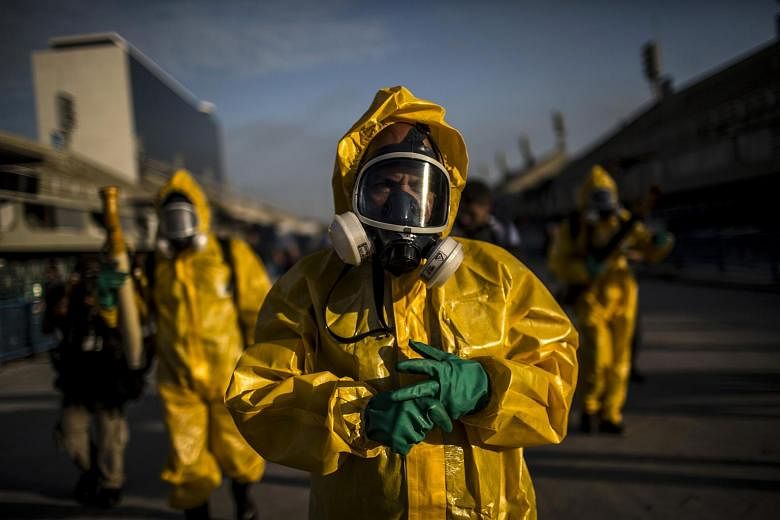RIO (AFP) - The scare over the Zika virus, thought to cause brain damage in babies, is spooking Brazilians who fear mosquitoes carrying the disease will be unwelcome guests at Rio's mega-Carnival.
The authorities fear that the hordes of revelers in bikinis thronging Rio de Janeiro next week in its world-famous Carnival will offer a feast for the mosquitoes that carry the fever.
Fumigators in overalls and goggles on Tuesday (Jan 26) sprayed the city's Sambadrome Carnival stadium, to prevent the disease-bearing Aedes aegypti mosquitoes buzzing around it.
The venue will host Rio's elaborate annual parades on Feb 7 and 8, and also the archery contest during the 2016 Olympics.
"The concern is very great in all of Rio because it's a city for mega-events," said Marcos Vinicius Ferreira, spokesman for Rio's health department.
"During the Carnival there'll be crowds of people from different parts of the world and Brazil, which will help the virus get in," he said.
"The main thing is to get rid of mosquito breeding sites."
Zika has been linked to serious birth defects, including microcephaly, in which babies are born with abnormally small heads.
A surge in microcephalic babies born to women infected with Zika during pregnancy in Latin America, notably in Brazil, has prompted the United States and other governments to warn pregnant women against travelling to affected countries.
That is an alarming prospect for Brazil, already struck by a deep recession, as it prepares to welcome visitors to Rio for the Olympics.
"It is very difficult to control the Aedes aegypti mosquito in Rio, where a third of the population lives in slums with numerous places for them to proliferate," said Dr Roberto Medronho, an epidemiologist at Rio de Janeiro University.
He said the city suffers from "disorderly town planning and ineffective control measures" against disease.
Brazil's Health Ministry said on Monday it was mobilising more than 200,000 troops to go "house to house" giving out leaflets and advice against Zika.
Health Minister Marcelo Castro was quoted by the newspaper O Globo as saying that the government will also hand out repellent to at least 400,000 pregnant women on social welfare.
"Inspections will be intensified for the Olympic Games in August, even though that will be during a period when there are fewer mosquitoes" due to the cooler weather, the city hall said in a statement on Sunday.
Next week, however, "during the Carnival, at the height of summer and with so many people moving around, there is an objective risk of contracting Zika", warned Dr Medronho.
CMr astro said on Monday that the health authorities had been fighting the mosquitoes for 30 years and right now seem to be losing the "war" against them.
He echoed the authorities in other countries by advising women to avoid getting pregnant for the time being because of the Zika threat.
The British and French embassies have warned athletes and other visitors from their countries about the virus.
The World Health Organisation (WHO) said Zika is expected to spread to all countries in the Americas except Canada and Chile, where there are no Aedes aegypti mosquitoes.
One resident of Rio, Ms Manuela Mehl, said she was "really nervous" when she learned that Zika was thought to cause microcephaly, as she is 16 weeks pregnant with her second child.
"I even stopped leaving the house," said 37-year-old Ms Mehl. The risk is said to be highest in early pregnancy like hers was at the time.
"But I tried to relax because there isn't much I can control. So I protect myself, I don't go to certain high-risk areas," she said.
Ms Mehl shows a collection of some 30 anti-mosquito products she has stocked up.
"I have to carry this pregnancy to term as serenely as possible so that the baby stays calm and everything goes well," she added.
The WHO has noted a surge in cases of microcephaly in Brazil. It said there were 3,893 suspected cases there, compared to an average of about 160 a year.
Dr Medronho reckoned the Zika drama was comparable to the thalidomide affair, in which a generation of babies were born with missing or deformed limbs due to a drug prescribed to pregnant mothers.
"It is a tragedy for the families, most of all the poorest ones," he said of the Zika outbreak.
There have been no confirmed cases of the virus spreading person to person. For most people infected, the flu-like symptoms clear up in about a week.
But for the unborn babies whose mothers catch it, Zika can be devastating and even deadly.
Of the cases detected in Brazil, at least 49 of the babies have died, according to the WHO.
"Some babies do not survive and others have after-effects," said Dr Medronho."Over the years, other anomalies can occur such as deafness. This is surely just the tip of the iceberg."

